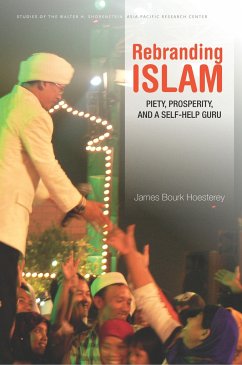- Broschiertes Buch
- Merkliste
- Auf die Merkliste
- Bewerten Bewerten
- Teilen
- Produkt teilen
- Produkterinnerung
- Produkterinnerung
James B. Hoesterey is Assistant Professor of Religion at Emory University.
Andere Kunden interessierten sich auch für
![Islamic Leaders: Their Biographies & Accomplishments Islamic Leaders: Their Biographies & Accomplishments]() Saul Silas FathiIslamic Leaders: Their Biographies & Accomplishments25,99 €
Saul Silas FathiIslamic Leaders: Their Biographies & Accomplishments25,99 €![City of Lies City of Lies]() Ramita NavaiCity of Lies15,99 €
Ramita NavaiCity of Lies15,99 €![Why Religion? Why Religion?]() Elaine PagelsWhy Religion?24,99 €
Elaine PagelsWhy Religion?24,99 €![IF THE OCEANS WERE INK IF THE OCEANS WERE INK]() Carla PowerIF THE OCEANS WERE INK20,99 €
Carla PowerIF THE OCEANS WERE INK20,99 €![Lost Boy Lost Boy]() Brent W JeffsLost Boy16,99 €
Brent W JeffsLost Boy16,99 €![Pillars Pillars]() Rachel Pieh JonesPillars16,99 €
Rachel Pieh JonesPillars16,99 €![The Islamist: Why I Became an Islamic Fundamentalist, What I Saw Inside, and Why I Left The Islamist: Why I Became an Islamic Fundamentalist, What I Saw Inside, and Why I Left]() Ed HusainThe Islamist: Why I Became an Islamic Fundamentalist, What I Saw Inside, and Why I Left15,99 €
Ed HusainThe Islamist: Why I Became an Islamic Fundamentalist, What I Saw Inside, and Why I Left15,99 €-
-
-
Produktdetails
- Produktdetails
- Verlag: Stanford University Press
- Seitenzahl: 296
- Erscheinungstermin: 11. November 2015
- Englisch
- Abmessung: 228mm x 151mm x 20mm
- Gewicht: 407g
- ISBN-13: 9780804796378
- ISBN-10: 0804796378
- Artikelnr.: 42793383
- Verlag: Stanford University Press
- Seitenzahl: 296
- Erscheinungstermin: 11. November 2015
- Englisch
- Abmessung: 228mm x 151mm x 20mm
- Gewicht: 407g
- ISBN-13: 9780804796378
- ISBN-10: 0804796378
- Artikelnr.: 42793383
James B. Hoesterey is Assistant Professor of Religion at Emory University.
Contents and Abstracts
Introduction: Authority, Subjectivity, and the Cultural Politics of Public
Piety
chapter abstract
The Introduction frames the book in terms of the anthropology of psychology
and it within theoretical conversations concerning religious authority,
Muslim subjectivity, and the cultural politics of public piety. It argues
that Aa Gym garnered religious authority through adept use of media and the
deliberate cultivation of his personal brand in the religious marketplace
of modernity. His authority was marked by distinctive affective and
economic relationships between preacher-producer and consuming devotees. It
also argues that Islamic self-help psychology promotes models of personhood
that are commensurate with, but cannot be reduced to, neoliberal logics of
self-enterprise and democratic notions of civic virtue. Aa Gym also
leveraged his public pulpit into political voice in an attempt to
discipline state actors during the drafting of controversial
anti-pornography legislation. The Introduction argues that scholarly
understandings of political Islam must focus on popular culture, not simply
electoral politics and formal institutions.
1Branding Islam: Autobiography, Authenticity, and Religious Authority
chapter abstract
Known across the Indonesian archipelago as a shrewd entrepreneur, doting
husband, and virtuous family man, Gymnastiar legitimated his claim to
religious authority through his ability to market himself as the embodiment
of Islamic virtue. This chapter///////
2Enchanting Science: Popular Psychology as Religious Wisdom
chapter abstract
3Ethical Entrepreneurs: Islamic Ethics and the Spirit of Capitalism
chapter abstract
4Prophetic Cosmopolitanism: The Prophet Muhammad as Psycho-Civic exemplar
chapter abstract
5Shaming the State: Pornography and the Moral Psychology of Statecraft
chapter abstract
6Sincerity and Scandal: The Moral and Market Logics of Religious Authority
chapter abstract
Conclusion: Figuring Islam: Popular Culture and the Cutting Edge of Public
Piety
chapter abstract
Introduction: Authority, Subjectivity, and the Cultural Politics of Public
Piety
chapter abstract
The Introduction frames the book in terms of the anthropology of psychology
and it within theoretical conversations concerning religious authority,
Muslim subjectivity, and the cultural politics of public piety. It argues
that Aa Gym garnered religious authority through adept use of media and the
deliberate cultivation of his personal brand in the religious marketplace
of modernity. His authority was marked by distinctive affective and
economic relationships between preacher-producer and consuming devotees. It
also argues that Islamic self-help psychology promotes models of personhood
that are commensurate with, but cannot be reduced to, neoliberal logics of
self-enterprise and democratic notions of civic virtue. Aa Gym also
leveraged his public pulpit into political voice in an attempt to
discipline state actors during the drafting of controversial
anti-pornography legislation. The Introduction argues that scholarly
understandings of political Islam must focus on popular culture, not simply
electoral politics and formal institutions.
1Branding Islam: Autobiography, Authenticity, and Religious Authority
chapter abstract
Known across the Indonesian archipelago as a shrewd entrepreneur, doting
husband, and virtuous family man, Gymnastiar legitimated his claim to
religious authority through his ability to market himself as the embodiment
of Islamic virtue. This chapter///////
2Enchanting Science: Popular Psychology as Religious Wisdom
chapter abstract
3Ethical Entrepreneurs: Islamic Ethics and the Spirit of Capitalism
chapter abstract
4Prophetic Cosmopolitanism: The Prophet Muhammad as Psycho-Civic exemplar
chapter abstract
5Shaming the State: Pornography and the Moral Psychology of Statecraft
chapter abstract
6Sincerity and Scandal: The Moral and Market Logics of Religious Authority
chapter abstract
Conclusion: Figuring Islam: Popular Culture and the Cutting Edge of Public
Piety
chapter abstract
Contents and Abstracts
Introduction: Authority, Subjectivity, and the Cultural Politics of Public
Piety
chapter abstract
The Introduction frames the book in terms of the anthropology of psychology
and it within theoretical conversations concerning religious authority,
Muslim subjectivity, and the cultural politics of public piety. It argues
that Aa Gym garnered religious authority through adept use of media and the
deliberate cultivation of his personal brand in the religious marketplace
of modernity. His authority was marked by distinctive affective and
economic relationships between preacher-producer and consuming devotees. It
also argues that Islamic self-help psychology promotes models of personhood
that are commensurate with, but cannot be reduced to, neoliberal logics of
self-enterprise and democratic notions of civic virtue. Aa Gym also
leveraged his public pulpit into political voice in an attempt to
discipline state actors during the drafting of controversial
anti-pornography legislation. The Introduction argues that scholarly
understandings of political Islam must focus on popular culture, not simply
electoral politics and formal institutions.
1Branding Islam: Autobiography, Authenticity, and Religious Authority
chapter abstract
Known across the Indonesian archipelago as a shrewd entrepreneur, doting
husband, and virtuous family man, Gymnastiar legitimated his claim to
religious authority through his ability to market himself as the embodiment
of Islamic virtue. This chapter///////
2Enchanting Science: Popular Psychology as Religious Wisdom
chapter abstract
3Ethical Entrepreneurs: Islamic Ethics and the Spirit of Capitalism
chapter abstract
4Prophetic Cosmopolitanism: The Prophet Muhammad as Psycho-Civic exemplar
chapter abstract
5Shaming the State: Pornography and the Moral Psychology of Statecraft
chapter abstract
6Sincerity and Scandal: The Moral and Market Logics of Religious Authority
chapter abstract
Conclusion: Figuring Islam: Popular Culture and the Cutting Edge of Public
Piety
chapter abstract
Introduction: Authority, Subjectivity, and the Cultural Politics of Public
Piety
chapter abstract
The Introduction frames the book in terms of the anthropology of psychology
and it within theoretical conversations concerning religious authority,
Muslim subjectivity, and the cultural politics of public piety. It argues
that Aa Gym garnered religious authority through adept use of media and the
deliberate cultivation of his personal brand in the religious marketplace
of modernity. His authority was marked by distinctive affective and
economic relationships between preacher-producer and consuming devotees. It
also argues that Islamic self-help psychology promotes models of personhood
that are commensurate with, but cannot be reduced to, neoliberal logics of
self-enterprise and democratic notions of civic virtue. Aa Gym also
leveraged his public pulpit into political voice in an attempt to
discipline state actors during the drafting of controversial
anti-pornography legislation. The Introduction argues that scholarly
understandings of political Islam must focus on popular culture, not simply
electoral politics and formal institutions.
1Branding Islam: Autobiography, Authenticity, and Religious Authority
chapter abstract
Known across the Indonesian archipelago as a shrewd entrepreneur, doting
husband, and virtuous family man, Gymnastiar legitimated his claim to
religious authority through his ability to market himself as the embodiment
of Islamic virtue. This chapter///////
2Enchanting Science: Popular Psychology as Religious Wisdom
chapter abstract
3Ethical Entrepreneurs: Islamic Ethics and the Spirit of Capitalism
chapter abstract
4Prophetic Cosmopolitanism: The Prophet Muhammad as Psycho-Civic exemplar
chapter abstract
5Shaming the State: Pornography and the Moral Psychology of Statecraft
chapter abstract
6Sincerity and Scandal: The Moral and Market Logics of Religious Authority
chapter abstract
Conclusion: Figuring Islam: Popular Culture and the Cutting Edge of Public
Piety
chapter abstract








